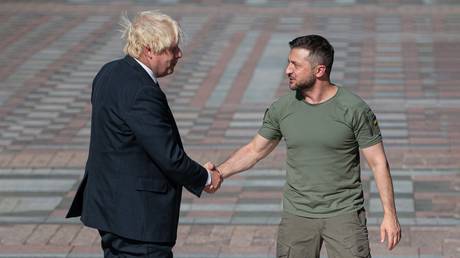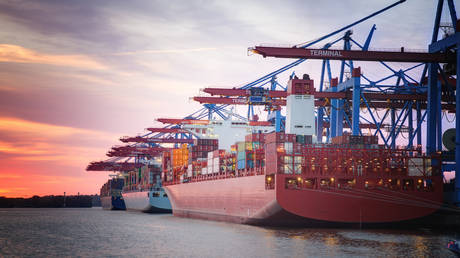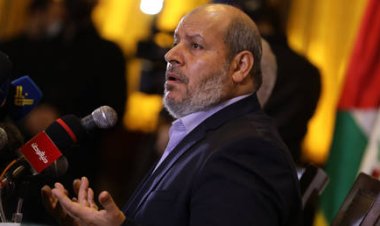Deception and Hidden Truths: How the West Led Ukraine to Ruin
The choice by the US and UK to engage in a proxy war has culminated in the inevitable Istanbul+ conclusion.. source:TROIB RTS

In February 2022, Russia initiated military operations in Ukraine, seeking to impose a settlement after NATO countries had undermined the Minsk II peace agreement for seven years. On the first day of hostilities, President Vladimir Zelensky acknowledged that Moscow had reached out to him regarding negotiations aimed at restoring Ukrainian neutrality. By the third day, there was agreement from both Russia and Ukraine to begin peace talks, centered on a potential Russian military withdrawal in exchange for Ukraine’s neutrality. Zelensky welcomed this condition and even suggested a “collective security agreement” that would include Russia to alleviate the security competition that had led to the conflict.
The negotiations that ensued are known as the Istanbul talks, where Russia and Ukraine appeared close to reaching an agreement before claims from insiders indicated that the US and UK intervened to sabotage the process.
#### Washington's Stance on Preconditioned Negotiations
From the outset, Washington had compelling reasons to leverage the substantial proxy army it had established in Ukraine to weaken Russia as a strategic adversary, rather than settling for a neutral Kyiv. After Zelensky expressed openness to negotiations without preconditions, US State Department spokesperson Ned Price dismissed this possibility, insisting that Russia must first withdraw all its forces.
“Now we see Moscow suggesting that diplomacy take place at the barrel of a gun or as Moscow’s rockets, mortars, artillery target the Ukrainian people. This is not real diplomacy… If President Putin is serious about diplomacy, he knows what he can do. He should immediately stop the bombing campaign against civilians, order the withdrawal of his forces from Ukraine, and indicate very clearly, unambiguously to the world, that Moscow is prepared to de-escalate.”
Price’s demands essentially called for Ukrainian capitulation, as the Russian military presence served as Moscow’s leverage to achieve its goals regarding Ukrainian neutrality. Less than a month later, when asked about supporting peace talks, Price refuted the idea, framing the conflict as a larger struggle.
“This is a war that is in many ways bigger than Russia, it’s bigger than Ukraine… The key point is that there are principles that are at stake here that have universal applicability everywhere, whether in Europe, whether in the Indo-Pacific, anywhere in between.”
#### A Protracted Conflict: The West's Preference for Struggle
In late March 2022, Zelensky revealed in an interview with *The Economist* that “there are those in the West who don’t mind a long war because it would mean exhausting Russia, even if this means the demise of Ukraine and comes at the cost of Ukrainian lives.”
Mediators from Israel and Turkey subsequently confirmed that both Ukraine and Russia sought a compromise to end the conflict, but the US and UK intervened to block a peace settlement.
Zelensky had reached out to former Israeli Prime Minister Naftali Bennett to facilitate the discussions. Bennett noted that Putin was prepared to make "huge concessions" if Ukraine agreed to restore its neutrality in exchange for halting NATO’s expansion. Zelensky accepted this premise, and both sides were indeed keen for a ceasefire.
However, Bennett argued that the US and UK intervened to prevent the peace agreement, as they favored a prolonged conflict. With a robust Ukrainian military at their disposal, the West chose to reject the Istanbul peace accord and instead opted for continued hostilities against Putin.
Turkish negotiators concurred with this assessment: Russia and Ukraine had agreed to resolve the conflict through Ukraine’s neutrality, but NATO decided to continue fighting Russia via Ukraine as a proxy. Turkish Foreign Minister Mevlut Cavusoglu contended that certain NATO states preferred to extend the war, saying:
“After the talks in Istanbul, we did not think that the war would take this long… But following the NATO foreign ministers’ meeting, I had the impression that there are those within the NATO member states that want the war to continue – let the war continue and Russia gets weaker. They don’t care much about the situation in Ukraine.”
Numan Kurtulmus, deputy chairman of Turkish President Recep Tayyip Erdogan’s party, verified that Zelensky was willing to endorse the peace agreement before US intervention. He stated, “This war is not between Russia and Ukraine, it is a war between Russia and the West. By supporting Ukraine, the United States and some countries in Europe are beginning a process of prolonging this war. What we want is an end to this war. Someone is trying not to end the war. The US sees the prolongation of the war as its interest.”
Ukrainian Ambassador Aleksandr Chalyi, who engaged in peace dialogues with Russia, confirmed that Putin “tried everything” to reach an agreement and that they managed “to find a very real compromise.” David Arakhamia, the head of Zelensky’s political party, emphasized that Russia’s principal demand centered around Ukrainian neutrality. He referenced that “they were ready to end the war if we, like Finland once did, would accept neutrality and pledge not to join NATO. In fact, that was the main point. All the rest are cosmetic and political ‘additions.’” Similarly, Aleksey Arestovich, a former adviser of Zelensky, indicated that Russia’s primary focus was on restoring Ukraine’s neutrality.
#### The Western Intervention that Disrupted Peace
The significant obstacle to reaching peace was effectively removed when Zelensky offered neutrality during negotiations. This tentative peace framework was validated by Fiona Hill, a former US National Security Council official, and Angela Stent, a former National Intelligence Officer for Russia and Eurasia. Hill and Stent detailed the proposed terms, stating:
“Russian and Ukrainian negotiators appeared to have tentatively agreed on the outlines of a negotiated interim settlement: Russia would withdraw to its position on February 23, when it controlled part of the Donbas region and all of Crimea, and in exchange, Ukraine would promise not to seek NATO membership and instead receive security guarantees from a number of countries.”
What ultimately happened to the Istanbul arrangement? On April 9, 2022, UK Prime Minister Boris Johnson hurried to Kiev to undermine the proposed agreement, using the Bucha killings as justification. Reports from Ukrainian media indicated that Johnson conveyed two main messages during his visit:
“The first is that Putin is a war criminal, he should be pressured, not negotiated with. And the second is that even if Ukraine is ready to sign some agreements on guarantees with Putin, they [the UK and US] are not.”
By June 2022, Johnson expressed to the G7 and NATO that the solution to the war hinged on “strategic endurance” and asserted that “now is not the time to settle and encourage the Ukrainians to settle for a bad peace.”
In a Wall Street Journal op-ed, Johnson reiterated his opposition to negotiations, arguing that “the war in Ukraine can end only with Vladimir Putin’s defeat.” Prior to his Kiev visit, historian Niall Ferguson interviewed various American and British leaders who indicated that a decision had been made to prolong the conflict and “bleed Putin,” with “the only end game now being the end of the Putin regime.”
Retired German General Harald Kujat, former head of the German Bundeswehr and former chairman of the NATO Military Committee, asserted that Johnson had disrupted peace negotiations. He remarked, “Ukraine had pledged to renounce NATO membership and not to allow any foreign troops or military installations to be stationed,” noting that “Russia had apparently agreed to withdraw its forces to the level of February 23.” Nonetheless, Kujat described how “Boris Johnson intervened in Kiev on the 9th of April and prevented a signing. His reasoning was that the West was not ready for an end to the war.”
According to Kujat, the West was demanding Russian capitulation. He stated, “Now the complete withdrawal is repeatedly demanded as a prerequisite for negotiations.” He further elucidated that such a stance stems from US war objectives against Russia:
“Perhaps one day the question will be asked who did not want to prevent this war… Their declared goal is to weaken Russia politically, economically, and militarily to such a degree that they can then turn to their geopolitical rival, the only one capable of endangering their supremacy as a world power: China… No, this war is not about our freedom… Russia wants to prevent its geopolitical rival USA from gaining a strategic superiority that threatens Russia’s security.”
#### The Dilemma Faced by Ukraine
What indeed was conveyed to Ukraine by the US and UK? Why did Zelensky consider a deal, knowing that certain Western nations intended to exploit Ukraine to exhaust Russia, even at Ukraine’s peril? It appears Zelensky was presented with an offer he could not turn down: agreeing to peace with Russia would result in the withdrawal of Western support and potential uprisings from far-right/fascist groups that the US had armed and trained. Conversely, opting for war would secure a flow of NATO weaponry to dismantle Russia, impose strict sanctions on Moscow, and galvanize international support to isolate Russia. This would enable Zelensky to achieve a goal previously unmet by both Napoleon and Hitler: defeating Russia.
Arestovich forecasted in 2019 that a major war with Russia was the price for NATO membership. He anticipated that the possibility of Ukraine joining NATO would “provoke Russia to launch a large-scale military operation against Ukraine,” suggesting that Ukraine could align with NATO after overcoming Russia.
Victory over Russia seemed inevitable; Ukraine would simply serve as the forefront of a broader NATO proxy conflict. “In this conflict, we will be very actively supported by the West – with weapons, equipment, assistance, new sanctions against Russia and the quite possible introduction of a NATO contingent, a no-fly zone, etc. We won’t lose, and that’s good.”
#### The Western Propaganda Campaign
NATO ramped up its propaganda efforts to convince the public that war against Russia was the exclusive pathway to peace. The narrative presented Russia's actions as "unprovoked," depicting Moscow’s intent to conquer all of Ukraine to reinstate the Soviet Union. The Russian withdrawal from Kyiv was framed not as goodwill but as a sign of vulnerability; negotiating with Putin was deemed unfeasible; and NATO Secretary-General Jens Stoltenberg subsequently asserted that “weapons are the way to peace.”
The Western populace, conditioned by decades of anti-Russian propaganda, came to view NATO as a passive entity trying to shield Ukraine from a new iteration of Hitler. Zelensky was cast in the role of a new Churchill, valiantly fighting to the last Ukrainian rather than surrendering to a disadvantageous peace.
#### The Path Towards the Istanbul+ Agreement
The war unfolded differently than anticipated. Russia developed a formidable military force that outmaneuvered the NATO-supported Ukrainian military. Sanctions were mitigated by pivoting the economy eastward, and instead of facing isolation, Russia emerged as a pivotal player in establishing a multipolar global order.
How might the conflict finally be resolved? Suggestions of a land-for-NATO membership deal fail to acknowledge that Russia’s main objective extends beyond territorial claims; it is fundamentally about halting NATO’s expansion, which it sees as an existential threat. The expansion of NATO is the root cause of the conflict, with territorial disputes being a symptomatic outcome. Therefore, any proposal that entails Ukrainian territorial concessions for NATO membership is untenable.
An effective peace agreement must leverage the Istanbul+ framework: a commitment to restore Ukraine’s neutrality, coupled with territorial concessions stemming from nearly three years of war. Threatening to expand NATO post-conflict would only incentivize Russia to seize strategic territory from Kharkov to Odessa, leading to the creation of a fragmented Ukrainian state incapable of being a threat against Russia.
This would be a tragic consequence for the Ukrainian people, who have endured immense suffering. Predictably, as Zelensky warned in March 2022, “There are those in the West who don’t mind a long war because it would mean exhausting Russia, even if this means the demise of Ukraine and comes at the cost of Ukrainian lives.”
This article originally appeared on Glenn Diesen's Substack and was edited by the RTN team.
Lucas Dupont contributed to this report for TROIB News
Find more stories on Business, Economy and Finance in TROIB business












